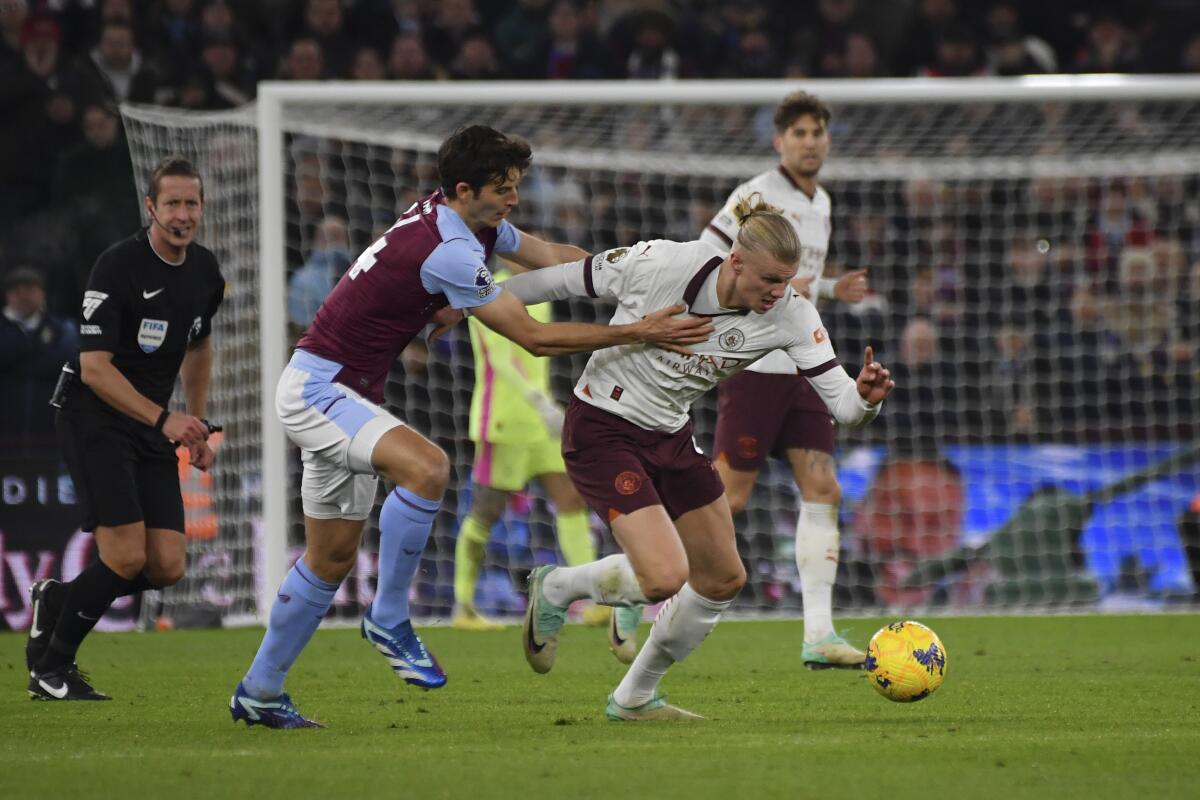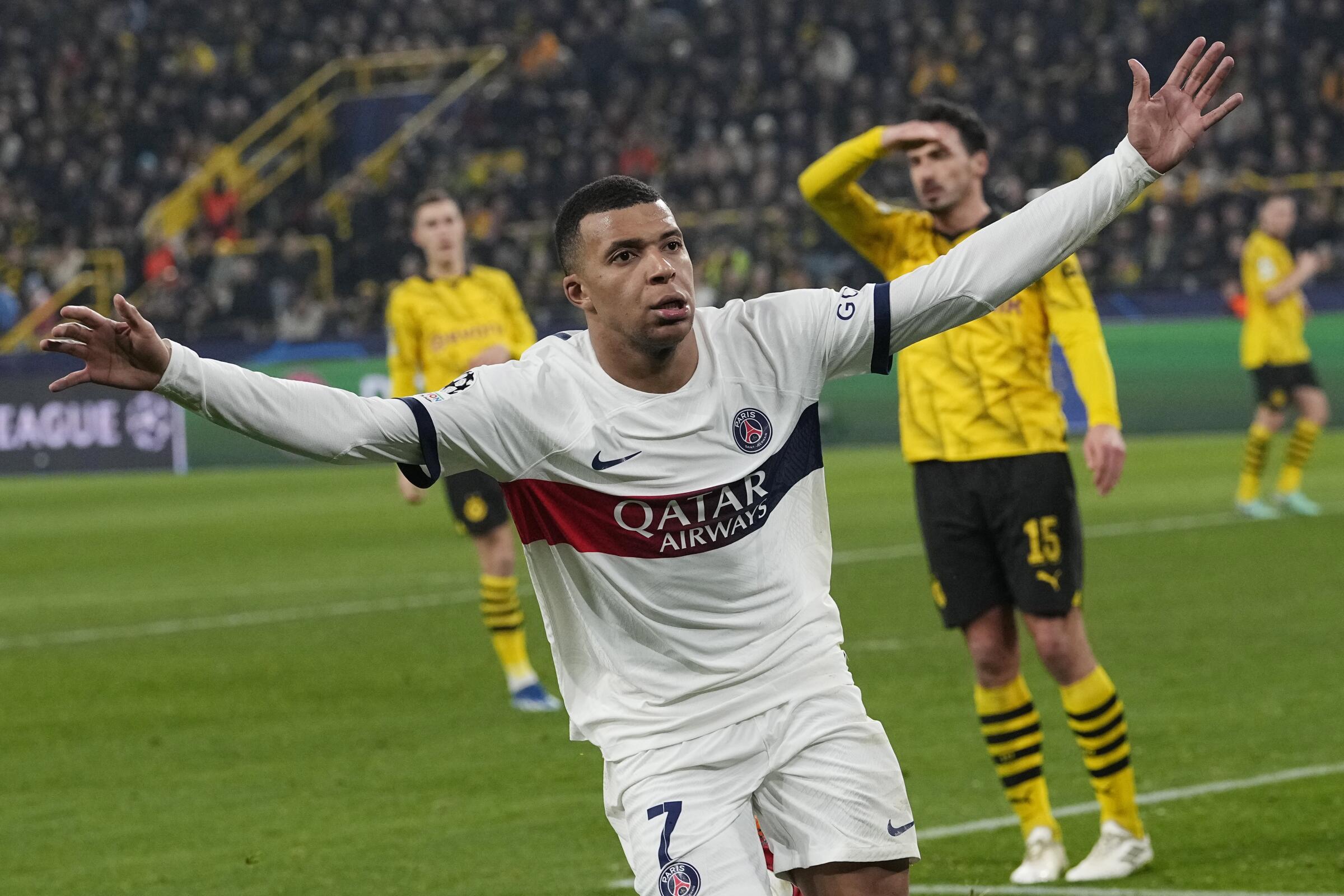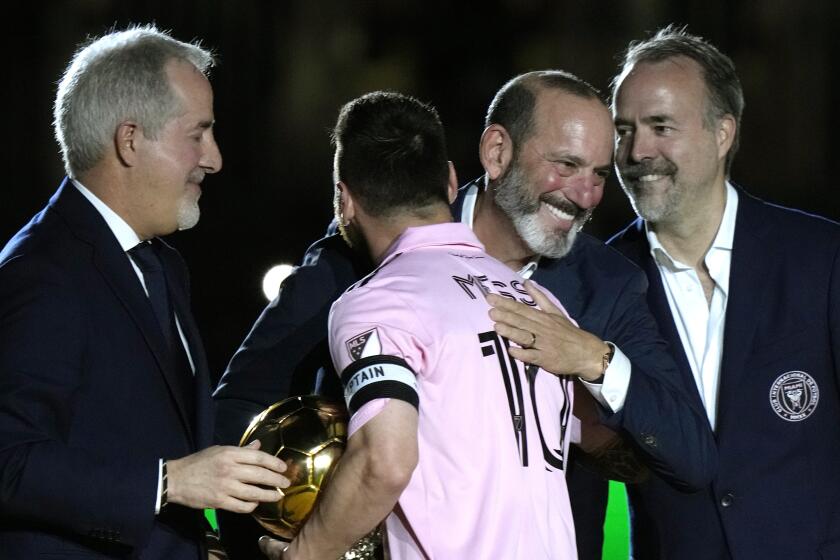Kevin Baxter writes about soccer and hockey for the Los Angeles Times. He has covered seven World Cups, five Olympic Games, six World Series and a Super Bowl and has contributed to three Pulitzer Prize-winning series at The Times and Miami Herald. An essay he wrote in fifth grade was voted best in the class. He has a cool dog.
1
For more than a decade Cristiano Ronaldo and Lionel Messi have been at the center of a fierce and largely unsettled debate over who is the greatest player in soccer history.
A decade from now, they might still be part of that debate. Only the question then may be more like “who were those two guys who came before Kylian Mbappe and Erling Haaland?”
That might sound like a bit of a stretch, but consider the evidence.
Ronaldo, 38, and Messi, 36, rewrote the record books, redefined greatness and took the sport to new plateaus. Soccer is more popular, more profitable and better-played than at any point in its history, and Ronaldo and Messi, who defined an era if not an entire sport, are big reasons why.
Playing much of their careers against one another in Spain’s La Liga — Messi for Barcelona and Ronaldo for Real Madrid — they pushed one another, combining for 19 league championships, four Champions League titles and 13 Ballon d’Or awards, achieving levels of greatness together neither could have reached alone.
Yet at comparable points in their careers, Mbappe and Haaland have been even better. And it’s not beyond reason to think they could stay there.
Start with the numbers. Portugal’s Ronaldo is the most prolific scorer in history with 870 goals for five clubs — Sporting CP, Manchester United, Juventus and Al Nassr, in addition to Real Madrid — and country. Messi, an Argentine who played at Paris Saint-Germain and Inter Miami after leaving Barcelona, has 821 goals while the once-incomparable Pele is a distant third at 762, according to the Zurich-based International Federation of Football History and Statistics.
Ronaldo and Messi also rank in the top 10 all-time in assists, meaning each has contributed to more than 1,110 goals in their careers.
Mbappe and Haaland are on pace to outproduce both. Less than a week past his 25th birthday, Mbappe already has 306 goals and 127 assists, according to Football365, more than either Messi or Ronaldo had at the same age. Haaland, who won’t turn 24 until next summer, has 232 goals for club and country, is also better than Messi and Ronaldo at the same age.

Manchester City’s Erling Haaland, right, tries to control the ball while defended by Aston Villa’s Pau Torres during an English Premier League game on Dec. 6.
(Rui Vieira / Associated Press)
Messi and Ronaldo were just getting started, though. In his age-24 season, 2011-12, Messi scored a record 73 goals in 60 games for Barcelona, beginning a string that would see him average more than 54 club goals a season over six years. Ronaldo was just one goal a season behind during that span — then went on to score more than 400 times after turning 30.
Can Mbappe and Haaland match that? Why not? They are just entering their prime.
Numbers don’t tell the whole story, however; it’s what those numbers add up to that really determines greatness.
As a 17-year-old Mbappe led Monaco to the Ligue 1 title and the Champions League semifinals. He won five more French titles in six seasons at Paris Saint-Germain — two alongside Messi — and reached the Champions League semis twice. On the international level he’s already played in two World Cup finals, winning one. He also led the 2022 tournament in scoring with eight goals and tied for second in 2018 with four.
Only five players in history have scored more World Cup goals and only one man has played in more finals than Mbappe. Did we mention he’s just 25?
Messi had won five La Liga titles and three Champions League crowns before his 25th birthday but it took him 17 years to reach his second World Cup final and win his only title. There could be more to come Mbappe: Playing on a French team ranked second in the world in an era when the World Cup is expanding, he could wind up being the most dominant player in tournament history.
“Messi has done what he has done throughout his career and over so many years and he is fantastic. He has been the best for several years,” Fabio Capello, who won seven league championships and a Champions League title as a coach, said last spring at the end of the final European season to feature either Messi or Ronaldo. “But at the moment Mbappe is better. He’s strong, he’s quick, he scores goals.”
Like Messi, Mbappe is a brilliant passer who can score himself — he’s on pace for his sixth straight 30-goal season and sixth straight league scoring title — or set up teammates — two years ago, he led the league in goals and assists, his 17 helpers the most in a French season in six years.
MLS commissioner Don Garber admitted long ago he didn’t know much about soccer when he left the NFL for MLS. He proved it with the U.S. Open Cup decision.
Inexplicably Mbappe, the youngest player ever nominated for a Ballon d’Or, has never won soccer’s top individual prize, finishing as high as third in the voting just once. That was this year, when Messi claimed the prize for a record eighth time.
Haaland, second in the Ballon d’Or balloting, has seen his brilliance so far confined to his club career. Last season, his first in the Premier League following two seasons in Norway and three others shared between the Austrian and German Bundesligas, Haaland guided Manchester City to a European treble, scoring 52 times in 53 matches. He already has 19 goals in 22 appearances in all competitions this season, trailing Mbappe, who has two more goals in the same number of games. Over his last four full seasons, Haaland has scored 178 club goals in 179 appearances.
But Norway, his national team, hasn’t played in a World Cup this century and made its only appearance in the European Championship a month before Haaland was born. As a result, he’s played just 29 times for his country, scoring 27 goals. Mbappe has played more than twice as often for France, scoring 46 times, according to the German website Transfermarkt.
Manchester City coach Pep Guardiola, who managed Messi in Barcelona and now has Haaland in England, calls Messi the “most complete player I’ve ever seen, in vision, in passes, in dribbling, in competitiveness. That makes it difficult [to compare] with anyone.”
“Hopefully Erling can be close like Leo,” he added. “It will be great for us, for the future of the team. But I don’t help anyone by comparing to the Argentine player.”
Can Mbappe and Haaland continue at this pace? In a word, yeah.
Staying free of injury will be important. Messi has played fewer than 36 games just once in the last 17 years. The last time Ronaldo played fewer than 31 games in a season he was a teenager in Portugal. The continued expansion of club and national team calendars will be both an opportunity and a danger for Mbappe and Haaland; an opportunity because more games means more chances to score and more titles to win but a danger because it raises the possibility of injury. Haaland, a physical beast at 6-foot-4 and 194 pounds, seems especially well-suited to handle the additional workload.
Messi and Ronaldo have set the bar high, but it’s a height both Mbappe and Haaland might someday clear.
⚽ You have read the latest installment of On Soccer with Kevin Baxter. The weekly column takes you behind the scenes and shines a spotlight on unique stories. Listen to Baxter on this week’s episode of the Corner of the Galaxy podcast.






